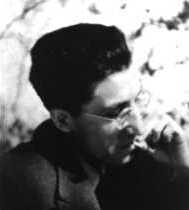Cesare Pavese
| Cesare Pavese | |
|---|---|

Cesare Pavese, il poeta
|
|
| Born |
9 September 1908 Santo Stefano Belbo |
| Died | 27 August 1950 (aged 41) Turin |
| Cause of death | suicide |
| Occupation | Italian poet, novelist, literary critic and translator |
| Signature | |
Cesare Pavese (Italian: [ˈtʃeːzare paˈveːze]; 9 September 1908 – 27 August 1950) was an Italian poet, novelist, literary critic and translator. He is widely considered among the major authors of the 20th century in his home country.
Cesare Pavese was born in Santo Stefano Belbo, in the province of Cuneo. It was the village where his father was born and where the family returned for the summer holidays each year. He started infant classes in Santo Stefano Belbo, but the rest of his education was in schools in Turin. His most important teacher at the time was Augusto Monti, writer and educator, whose writing style attempted to be devoid of all rhetoric.
As a young man of letters, Pavese had a particular interest in English-language literature, graduating from the University of Turin with a thesis on the poetry of Walt Whitman. Among his mentors at the university was Leone Ginzburg, expert on Russian literature and literary critic, husband of the writer Natalia Ginzburg and father of the future historian Carlo Ginzburg. In those years, Pavese translated both classic and recent American and British authors that were then new to the Italian public.
Pavese moved in antifascist circles. In 1935 he was arrested and convicted for having letters from a political prisoner. After a few months in prison he was sent into "confino", internal exile in Southern Italy, the commonly used sentence for those guilty of lesser political crimes. (Carlo Levi and Leone Ginzburg, also from Turin, were similarly sent into confino.) A year later Pavese returned to Turin, where he worked for the left-wing publisher Giulio Einaudi as editor and translator. Natalia Ginzburg also worked there.
Pavese was living in Rome when he was called up into the fascist army, but because of his asthma he spent six months in a military hospital. When he returned to Turin, German troops occupied the streets and most of his friends had left to fight as partisans. Pavese fled to the hills around Serralunga di Crea, near Casale Monferrato. He took no part in the armed struggle taking place in that area. During the years in Turin, he was the mentor of the young writer and translator Fernanda Pivano, his former student at the Liceo D'Azeglio. Pavese gave her the American edition of Spoon River Anthology, which came out in Pivano's Italian translation in 1943.
...
Wikipedia
